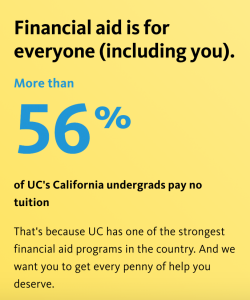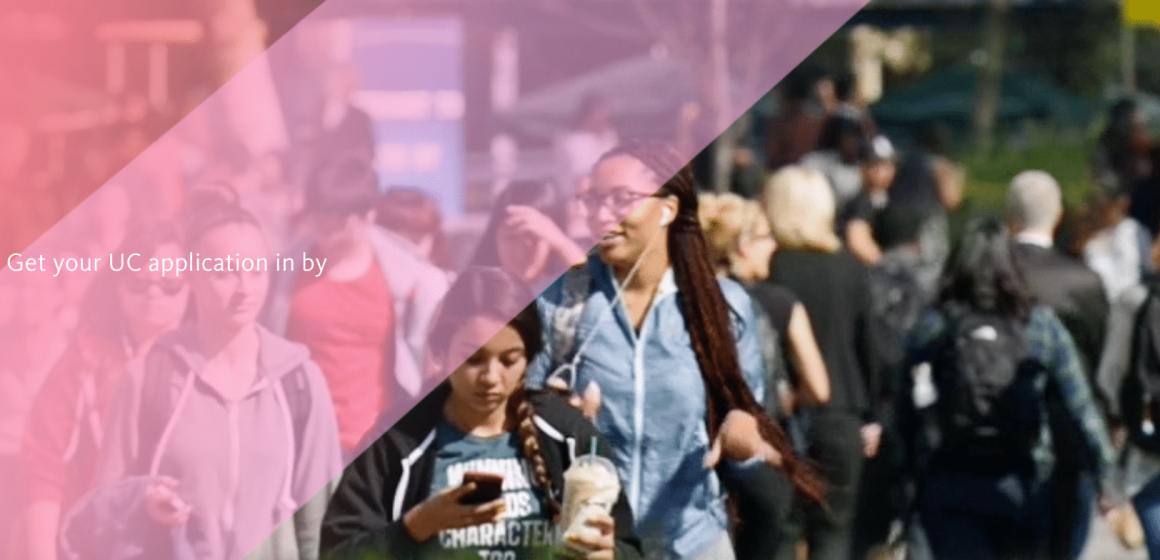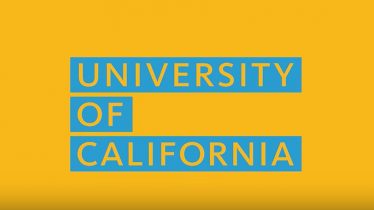How to Ace the UC Personal Insight Questions
Gabrielle Glancy (Gabby) helped my son get into UCLA and Berkeley. We were so happy with her advise and expertise. The process was seamless! No one knows how to get into The University of California like Gabrielle Glancy. Based for many years in Berkeley/the Bay Area, she herself went to the The University of California. She’s lived the dream and knows how to help her students find their own way to writing great essays that get them in. — A. Pauli, Parent UCLA
The University of California is the single largest and most renowned state university system in the country. With 10 campuses to its name — Berkeley, UCLA, UC San Diego, UC Santa Barbara, UC Davis, UC Merced, UC Santa Cruz, UC Irvine and UC Riverside — the University of California offers something for everyone.
Each campus offers an incredible range of experiences and academic programs. Whether you want to be in a big city, nestled in a redwood forest or on a bluff overlooking the Pacific Ocean . . .
And you may not know this but 56% of all students do not pay tuition at The University of California. Their financial add options are incredible.

Ok, so now tell me, how do I get into a UC?

The University of California does not use the Common App. Rather, they have their own set of Personal Insight Questions from which students are asked to choose four out of eight and answer them in such a way as to give the UC admissions committee insight into the personal life of the applicant:
Personal Insight Questions
Imagine UC was a person. If we met face-to-face, what would you want us to know about you? These personal insight questions allow you to tell us. You could write about your creative side. Your thoughts on leadership. A challenge you’ve faced. Whatever questions you answer, make sure you show us your personality—just as you would in real life.Directions
- You will have 8 questions to choose from. You must respond to only 4 of the 8 questions.
- Each response is limited to a maximum of 350 words.
- Which questions you choose to answer is entirely up to you: But you should select questions that are most relevant to your experience and that best reflect your individual circumstances.
Keep in mind
- All questions are equal: All are given equal consideration in the application review process, which means there is no advantage or disadvantage to choosing certain questions over others.
- There is no right or wrong way to answer these questions: It’s about getting to know your personality, background, interests and achievements in your own unique voice.
- Use the additional comments field if there are issues you’d like to address that you didn’t have the opportunity to discuss elsewhere on the application. This shouldn’t be an essay, but rather a place to note unusual circumstances or anything that might be unclear in other parts of the application. You may use the additional comments field to note extraordinary circumstances related to COVID-19, if necessary.
Questions & guidance
Remember, the personal questions are just that — personal. Which means you should use our guidance for each question just as a suggestion in case you need help. The important thing is expressing who you are, what matters to you and what you want to share with UC.
1. Describe an example of your leadership experience in which you have positively influenced others, helped resolve disputes or contributed to group efforts over time.
Things to consider: A leadership role can mean more than just a title. It can mean being a mentor to others, acting as the person in charge of a specific task, or taking the lead role in organizing an event or project. Think about what you accomplished and what you learned from the experience. What were your responsibilities?
Did you lead a team? How did your experience change your perspective on leading others? Did you help to resolve an important dispute at your school, church, in your community or an organization? And your leadership role doesn’t necessarily have to be limited to school activities. For example, do you help out or take care of your family?
2. Every person has a creative side, and it can be expressed in many ways: problem solving, original and innovative thinking, and artistically, to name a few. Describe how you express your creative side.
Things to consider: What does creativity mean to you? Do you have a creative skill that is important to you? What have you been able to do with that skill? If you used creativity to solve a problem, what was your solution? What are the steps you took to solve the problem?
How does your creativity influence your decisions inside or outside the classroom? Does your creativity relate to your major or a future career?
3. What would you say is your greatest talent or skill? How have you developed and demonstrated that talent over time?
Things to consider: If there’s a talent or skill that you’re proud of, this is the time to share it. You don’t necessarily have to be recognized or have received awards for your talent (although if you did and you want to talk about it, feel free to do so). Why is this talent or skill meaningful to you?
Does the talent come naturally or have you worked hard to develop this skill or talent? Does your talent or skill allow you opportunities in or outside the classroom? If so, what are they and how do they fit into your schedule?
4. Describe how you have taken advantage of a significant educational opportunity or worked to overcome an educational barrier you have faced.
Things to consider: An educational opportunity can be anything that has added value to your educational experience and better prepared you for college. For example, participation in an honors or academic enrichment program, or enrollment in an academy that’s geared toward an occupation or a major, or taking advanced courses that interest you — just to name a few.
If you choose to write about educational barriers you’ve faced, how did you overcome or strive to overcome them? What personal characteristics or skills did you call on to overcome this challenge? How did overcoming this barrier help shape who you are today?
5. Describe the most significant challenge you have faced and the steps you have taken to overcome this challenge. How has this challenge affected your academic achievement?
Things to consider: A challenge could be personal, or something you have faced in your community or school. Why was the challenge significant to you? This is a good opportunity to talk about any obstacles you’ve faced and what you’ve learned from the experience. Did you have support from someone else or did you handle it alone?
If you’re currently working your way through a challenge, what are you doing now, and does that affect different aspects of your life? For example, ask yourself, “How has my life changed at home, at my school, with my friends or with my family?”
6. Think about an academic subject that inspires you. Describe how you have furthered this interest inside and/or outside of the classroom.
Things to consider: Many students have a passion for one specific academic subject area, something that they just can’t get enough of. If that applies to you, what have you done to further that interest? Discuss how your interest in the subject developed and describe any experience you have had inside and outside the classroom — such as volunteer work, internships, employment, summer programs, participation in student organizations and/or clubs — and what you have gained from your involvement.
Has your interest in the subject influenced you in choosing a major and/or future career? Have you been able to pursue coursework at a higher level in this subject (honors, AP, IB, college or university work)? Are you inspired to pursue this subject further at UC, and how might you do that?
7. What have you done to make your school or your community a better place?
Things to consider: Think of community as a term that can encompass a group, team or a place — like your high school, hometown or home. You can define community as you see fit, just make sure you talk about your role in that community. Was there a problem that you wanted to fix in your community?
Why were you inspired to act? What did you learn from your effort? How did your actions benefit others, the wider community or both? Did you work alone or with others to initiate change in your community?
8. Beyond what has already been shared in your application, what do you believe makes you stand out as a strong candidate for admissions to the University of California?
Things to consider: If there’s anything you want us to know about you, but didn’t find a question or place in the application to tell us, now’s your chance. What have you not shared with us that will highlight a skill, talent, challenge or opportunity that you think will help us know you better?
From your point of view, what do you feel makes you an excellent choice for UC? Don’t be afraid to brag a little.

The UC application deadline, remember, is November 30.
This year, as a result of the pandemic, the UC’s have gone test-optional. What this means is you have a choice of whether or not to submit your SAT or ACT scores.
In my experience, most students won’t. Many of the students with whom I am working did not have the opportunity to take the test in March or June and opted not to take it in October.
Now more than ever, your answers (in the form of 350 word essays) can make you or break you.
Your essays are the means by which the Ad Com gets to meet you.
What you say, and how you say it, is all important. The Personal Insight Questions want to know what makes You, You!
Here are some tips for writing stand out essays that will increase your chances of getting into you into The University of California.
- REPURPOSE: By now you will most likely have written a Common App essay for your Early Action and/or Early Decision Schools. Not always, but often, your Common App essay can be repurposed and used for UC #5: Describe the most significant challenge you have faced and the steps you have taken to overcome this challenge. How has this challenge affected your academic achievement? All you have to do is cut your Common App essay down to 350 words. This may seem difficult, but actually, as long as you keep the meaning and the arc of story from beginning to end, you will able to reuse this essay.
- DIVERSIFY: You want to give the broadest, most comprehensive and varied sense of yourself that you can. For this reason, it’s a good idea to choose topics that will lend themselves to highlighting your many facets. One way to do this is to list five adjectives (ahead of time) that describe you in as broad a way as possible. You don’t want to choose “kind, sweet, gentle, compassionate and loving.” (even if you are!). Best to choose a broader range of adjectives such as hard-working, compassionate, witty, creative, and impatient (ok to choose one that’s not “positive.”)
- MAP OUT YOUR TOPICS: In general, I advise students NOT to outline their essays. This is a sure way to limit, rather than expand, your imagination. In this case, I am not suggesting you outline your essays only that you figure out which topics you will write on and what each essay may include. This is an offshoot, and a zoom in on the idea of diversifying. You want to be sure you are covering as many bases as possible.
- SHOW AND TELL: It is a rule of thumb, and widely accepted, that it is important not just to tell a story, but to use vivid details as well as action, dialogue and description to SHOW what you’re trying to TELL. The UC’s are looking for something a little different. They want an essay written in lively language that does not rely on illustrating moments via Action and Dialogue. Rather, they want you to tell your story and reflect on it. TONE down the SHOWING ;-). REFLECTION, ANALYSIS and VIVID DETAIL are your best friends.
- CHOOSE MOMENTS: Even though you will not necessarily be bringing these to life with action and dialogue, finding moments in your life that represent the qualities (adjectives) you are trying to illustrate is the best way to get specific and real. Everyone can say they are a great leader, but only by showing instances in which you exhibited conflict resolution, bringing groups to consensus, organizing events and meetings will you convince your reader you’re the real deal.
- BE HONEST, AUTHENTIC AND VULNERABLE: This goes without saying, but I’ll say it anyway. The Ad Com can tell whether you’re telling the truth. They can feel it. An essay written from the heart, even if it isn’t “perfect” or doesn’t show you as being “perfect” will go a long way in helping the Ad Com get to know you. It’s ok to be who you are in your essays.
- GET GOOD FEEDBACK: Every writer needs a good editor. That’s why there’s an entire profession devoted to giving feedback. Find a trusted reader, run your ideas by them, let them read your early drafts, and then ask them if the essay holds their attention from beginning to end and/or whether it has any glaring errors. This is crucial! You don’t want to send in an essay with grammatical errors and/or typos. Even if it’s well-written, this would be like going to your prom with poop on your shoe (excuse the example 😉 but ya know what I mean?
- ROLL OUT THE DOUGH BEFORE YOU CUT THE COOKIES: Rather than write to the 350 word limit, write all you need to write to fill out your essay — and then go back and cut. It’s much easier to cut than to generate. I would also suggest you splice together paragraph and create transitions rather than trying to write linearly, which almost always results in that which shall not be named — writer’s block.
For a more detailed description of the method I use to help students write essays that get them into the school(s) of their dreams, you may want to consult the two books I’ve written on the subject: The Art of the College Essay and UNSTUCK: How to Break Through Writer’s Block, Find Your Voice and Get Into the College of Your Dreams.
And of course, if you want personal guidance on the Personal Insight Questions, or on any other essays you’re working on, feel free to pick up the phone and give me a call at 415-637-1955 and/or BOOK AN INITIAL CONSULTATION and I’ll see you soon!
Oh, and stay tuned. My next post with be on the UC’s COVID SUPPLEMENT and will have examples of previous, winning UC ESSAYS.



